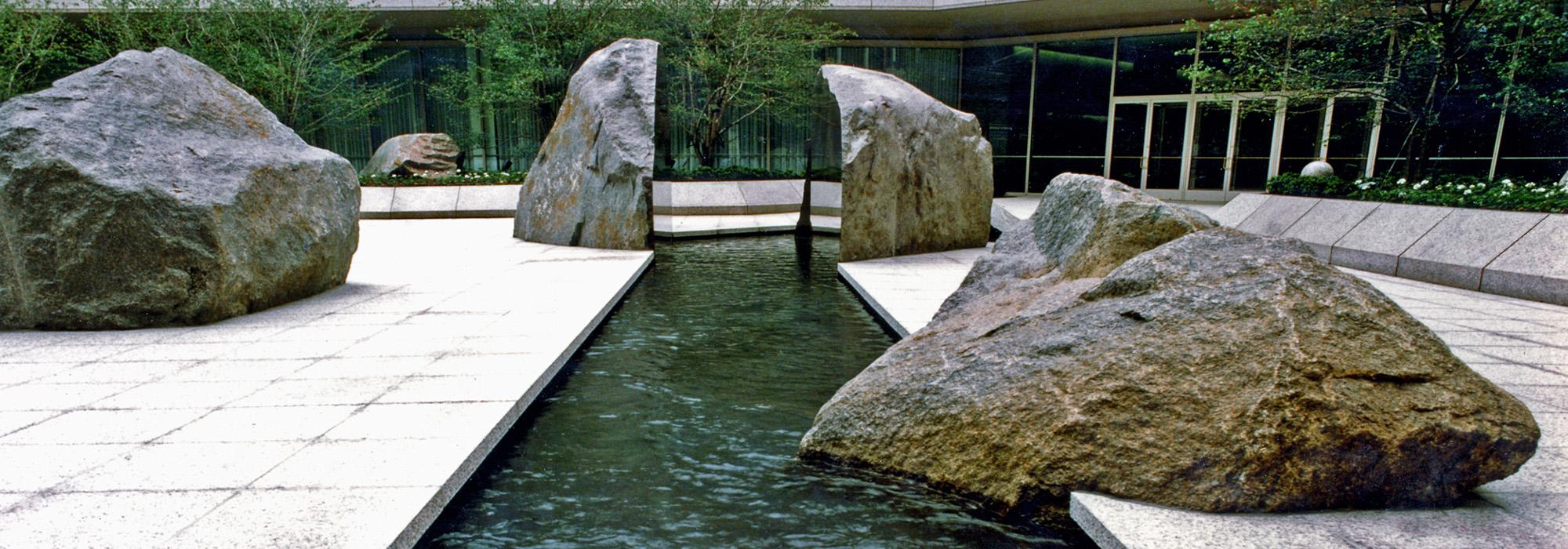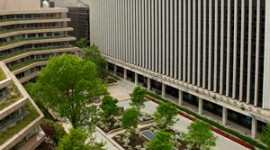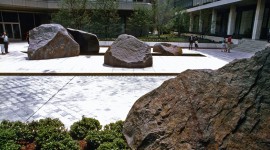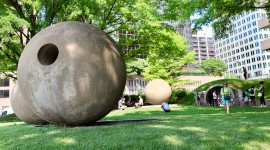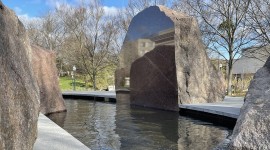Architecture Scholar: Threatened MARABAR is “an important piece of America’s art heritage” and “certainly one of the great works of the later twentieth century”
Media Contact: Nord Wennerstrom | T: 202.483.0553 | M: 202.225.7076 | E: nord@tclf.org
Marc Treib weighs in on threatened Elyn Zimmerman installation at the National Geographic Society
Washington, D.C. (April 8, 2020) – The Cultural Landscape Foundation (TCLF) today released a letter written by Marc Treib, Professor of Architecture Emeritus at the University of California, Berkeley, concerning the national importance of the New York-based artist Elyn Zimmerman’s site-specific installation MARABAR, located on the campus of the National Geographic Society in Washington, D.C. and threatened with demolition. In the letter, Treib said: “’Marabar’ is a key representative of American site-specific art, elegant in its form, impressive in its use of stone, and engaging in its effects.” He added: “It is certainly one of the great works of the later twentieth century, and one of the few located in a city.” The plaza on the National Geographic campus in which MARABAR is sited is slated for renovation, and plans for the new site do not include Zimmerman’s installation. On March 31, 2020, MARABAR was enrolled in TCLF’s Landslide program, which brings attention to nationally significant works of landscape architecture and landscape features that are threatened and at risk.
Treib’s letter was sent to the Washington, D.C., Historic Preservation Review Board (HPRB), one of the city agencies that have oversight of the proposed renovation. An August 1, 2019, vote by the HPRB approved the conceptual plans for the renovation, but it is as yet unclear, based on the project renderings and the HPRB staff report, whether the review board was properly made aware of the sculpture’s presence in the plaza, or of its significance. On April 1, 2020, TCLF sent a letter to the HPRB concerning the threat to MARABAR and asked the board to reconsider its earlier approval of the project.
About MARABAR
MARABAR, completed in 1984, was Zimmerman’s first large-scale and (ostensibly) permanent project. She received the commission not long after returning to the United States from India—a journey that marked her transition from being primarily a photographer and painter to a sculptor and environmental artist. The focal point of MARABAR is a rectangular reflecting pool (6 x 60 ft.) set amid five mahogany-colored granite boulders, three of which have highly polished and reflective surfaces, mirroring one another across the pool. The massive stones are deliberately shaped, having been sheared along natural cleft lines, their forms and positions alluding to some seismic event that has lacerated the plaza to reveal a natural spring. Because the boulders sink below the granite pavement, which also hovers above the water in the pool, the plaza's natural elements appear to antedate the man-made construction. Seven other boulders are strategically sited throughout the nearby gardens, creating individual moments of discovery and a dialogue with the pool ensemble. The title of the piece, bestowed after it was completed, derives from the fictional Marabar Caves (based on the real Barabar Caves outside the City of Gaya) in E.M. Forster’s A Passage to India.
About Elyn Zimmerman
Elyn Zimmerman’s work is featured in the collections of the Museum of Modern Art, the Whitney Museum of America Art, and the Los Angeles County Museum of Art, among other institutions, and it has been recognized by awards from the Art Commission of the City of New York, the National Endowment for the Arts, and the Maryland chapter of the American Society of Landscape Architects. Among her many large-scale public projects are commissions from the Institute for Advanced Studies, in Princeton, New Jersey; the Sydney and Walda Besthoff Sculpture Garden at the New Orleans Museum of Art; the U.S. State Department for the embassy in Dar es Salaam, Tanzania; and the Vancouver Art Commission for a prominent project in the city center. Zimmerman served as a member of the U.S. Commission of Fine Arts from 2003 to 2008, and in 2016 she, along with Tadao Ando, received the Isamu Noguchi Award, given annually to practitioners who “share Noguchi’s spirit of innovation, global consciousness, and East-West exchange.” For additional information, TCLF has published a conversation with Elyn Zimmerman.
About The Cultural Landscape Foundation
The Cultural Landscape Foundation (TCLF) is a 501(c)(3) non-profit founded in 1998 to connect people to places. TCLF educates and engages the public to make our shared landscape heritage more visible, identify its value, and empower its stewards. Through its website, publishing, lectures, and other events, TCLF broadens support and understanding for cultural landscapes. TCLF is also home to the Cornelia Hahn Oberlander International Landscape Architecture Prize.
# # #



